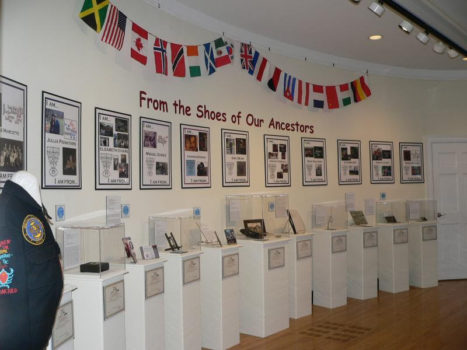 Southern Vermont College’s recent first-year seminar, From the Shoes of Our Ancestors, was a collaborative effort with the nearby Bennington Museum and Lincoln High School in Yonkers, N.Y.
Southern Vermont College’s recent first-year seminar, From the Shoes of Our Ancestors, was a collaborative effort with the nearby Bennington Museum and Lincoln High School in Yonkers, N.Y.
The students traced their roots by recording oral histories, documenting them through genealogical research, which included vital records searches and online investigations, and illustrating findings in family trees, graphic poster displays, audio recordings, and displays of family objects. Finally, exhibitors underwent DNA swab testing, and the DNA results provided scientific proof of ancestries.
Students benefited from the support of Ancestry.com and FamilyTreeDNA.com and the help of the museum staff in setting up an exhibit of their work. The displays in the exhibit the students created are the finished products of a process that took students on a dynamic exploration of their personal and family roots. This journey resembled those Henry Louis Gates, Jr., reported for the people highlighted in his PBS documentaries: African American Lives (2006) and Finding Oprah’s Roots, Finding Your Own (2007), as well as in the more recent documentaries Faces of America (2010) and Finding Your Roots (2012).
To review the process the exhibitors undertook through the semester, visit their Facebook site.
The course was offered to high school students at Lincoln High School in Yonkers, in accordance with the wishes of Gates, who wanted to see a postsecondary curriculum that emphasized family history, genealogical research, and DNA testing extended to the secondary level. In keeping with Martin Luther King Jr.’s dream, Gates envisioned such a gesture to be a specific attempt to keep young African American men in high school so they might graduate and seek a college education.
Clearly, such students become engaged in subject matters when those areas relate to themselves as explicitly as genealogy and DNA testing.
For example, the DNA testing the exhibitors underwent helped them verify their haplogroup (European; Sub-Saharan, or African; East Asian; or Native American) and, where this occurred, what percentage of different haplogroups they embody.
All students tested from Southern Vermont College are a mixture, as is Henry Louis Gates Jr., of various ethnicities and haplogroups. In planning the course and working with staff and students at Lincoln High School in Yonkers, we determined, as Gates wanted, that the 15 African American men would undergo yDNA testing to determine ancestry on their fathers’ sides.
Of the 15 Lincoln High students tested, 9 are Sub-Saharan (African) and all but one of those nine have a typical haplogroup designation, indicating that they probably came from Guinea or Angola. One of these 9 students has a significant haplogroup designation (B). According to Bennett Greenspan of FamilyTreeDNA.com, only 5% of African Americans have either a B or an A haplogroup designation. He believes that this student probably came to America on a Portuguese slave ship originating in what was Mozambique.
Two of the 15 students are Western European, probably descended from the English, Irish, or Scottish. One of the 15 students is European—probably descended from East or Northeast of Europe, likely a Viking. Another one of the 15 students has Swedish ancestry. One student is Semitic, though not necessarily Jewish, probably from Algeria. One student is Native American.
In May 2013, these Lincoln High students and their teacher joined my students at the Bennington Museum for a wonderful afternoon focused on our mutual exhibits about family history, genealogy and discussions of DNA testing.
The students from Lincoln High were treated to all that Southern Vermont College has to offer, including discussions with my students and members of the campus about what college life is like. (A memorandum of understanding between Southern Vermont College and Lincoln High School provides that the Lincoln High students will earn college credit, if they finish high school and go on to college.)
As Gates told the Vermont audience: “I believe if we can make people fall in love with themselves by discovering their ancestry both through paper-trail genealogy and the chemistry of DNA, we can motivate them again … You have to pursue all the learning and knowledge that you possibly can; that is the only way to liberate yourselves individually and your people.”
One young man from Lincoln High, Jency Ahedo, sent this poem to me, which he read aloud at the museum. Also note Jency’s description of why he wrote the poem.
Yes, sometimes dreams can come true.
Al DeCiccio is provost at Southern Vermont College.
[ssba]
